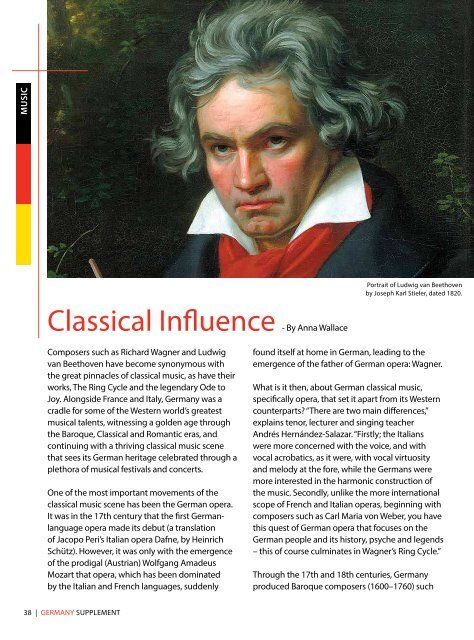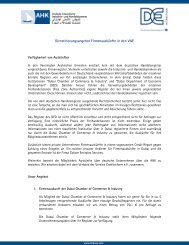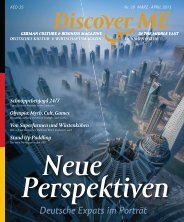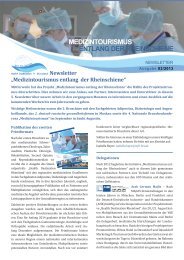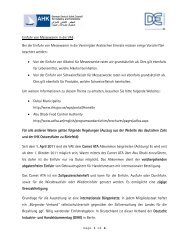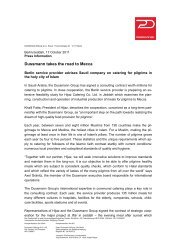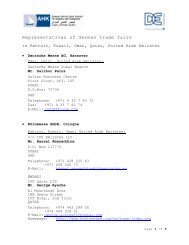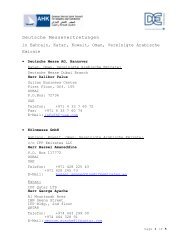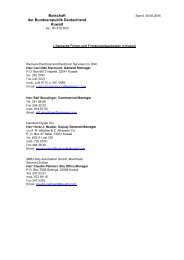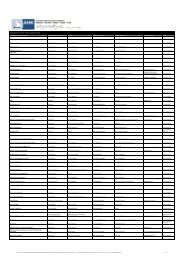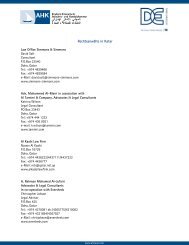germany - AHK - AHKs
germany - AHK - AHKs
germany - AHK - AHKs
You also want an ePaper? Increase the reach of your titles
YUMPU automatically turns print PDFs into web optimized ePapers that Google loves.
MUSIC<br />
Classical Influence - By Anna Wallace<br />
Composers such as Richard Wagner and Ludwig<br />
van Beethoven have become synonymous with<br />
the great pinnacles of classical music, as have their<br />
works, The Ring Cycle and the legendary Ode to<br />
Joy. Alongside France and Italy, Germany was a<br />
cradle for some of the Western world’s greatest<br />
musical talents, witnessing a golden age through<br />
the Baroque, Classical and Romantic eras, and<br />
continuing with a thriving classical music scene<br />
that sees its German heritage celebrated through a<br />
plethora of musical festivals and concerts.<br />
One of the most important movements of the<br />
classical music scene has been the German opera.<br />
It was in the 17th century that the first Germanlanguage<br />
opera made its debut (a translation<br />
of Jacopo Peri’s Italian opera Dafne, by Heinrich<br />
Schütz). However, it was only with the emergence<br />
of the prodigal (Austrian) Wolfgang Amadeus<br />
Mozart that opera, which has been dominated<br />
by the Italian and French languages, suddenly<br />
Portrait of Ludwig van Beethoven<br />
by Joseph Karl Stieler, dated 1820.<br />
found itself at home in German, leading to the<br />
emergence of the father of German opera: Wagner.<br />
What is it then, about German classical music,<br />
specifically opera, that set it apart from its Western<br />
counterparts? “There are two main differences,”<br />
explains tenor, lecturer and singing teacher<br />
Andrés Hernández-Salazar. “Firstly; the Italians<br />
were more concerned with the voice, and with<br />
vocal acrobatics, as it were, with vocal virtuosity<br />
and melody at the fore, while the Germans were<br />
more interested in the harmonic construction of<br />
the music. Secondly, unlike the more international<br />
scope of French and Italian operas, beginning with<br />
composers such as Carl Maria von Weber, you have<br />
this quest of German opera that focuses on the<br />
German people and its history, psyche and legends<br />
– this of course culminates in Wagner’s Ring Cycle.”<br />
Through the 17th and 18th centuries, Germany<br />
produced Baroque composers (1600–1760) such<br />
With its rich cultural history and<br />
diverse musical outpouring,<br />
Germany remains one of the<br />
world’s great classical music<br />
influences, with a wide array of<br />
musical festivals, concerts and<br />
events celebrating the lives of its<br />
composers, both past and present.<br />
as Telemann, who experimented with the<br />
opera form, paving the way for the thundering<br />
composers of the late Classical (1730 -1 820)<br />
through to the Romantic (1815 -1 910) periods<br />
– Beethoven, Wagner, Schumann, Mendelssohn,<br />
Strauss and Brahms perhaps being the most<br />
famous. Possibly the greatest composer of<br />
his generation, Beethoven took the opera<br />
form introduced by his Classical Austrian<br />
predecessor, Mozart, and used it to create his<br />
one and only opera, Fidelio, which has gone on<br />
to become one of the most important pieces in<br />
German opera.<br />
And then there is the inimitable Wagner –<br />
synonymous with great, nationalistic themes,<br />
expansive choruses and epic four- to five-hourlong<br />
performances. “The two great figures of<br />
Romantic German music were, in fact Wagner<br />
and Brahms,” explains Hernández-Salazar.<br />
“Wagner was the great innovative, Avant-garde<br />
composer of his time, harmonically speaking,<br />
while Brahms, though we see him also as a<br />
Romantic composer, saw himself as a Classical<br />
composer, following in the footsteps of Mozart<br />
and Beethoven. In the second half of the 19th<br />
century, there were two main camps in German<br />
music – you were either a Wagnerite or a<br />
Brahmsian, and these two completely opposite<br />
sides of modern music making dominated<br />
music in the second half of the 19th century<br />
in Germany.”<br />
Johan Botha and Emily Magee in a production of<br />
Richard Wagner’s ‘Lohengrin’. Photography by Dan Rest.<br />
38 | GERMANY SUPPLEMENT GERMANY SUPPLEMENT | 39


